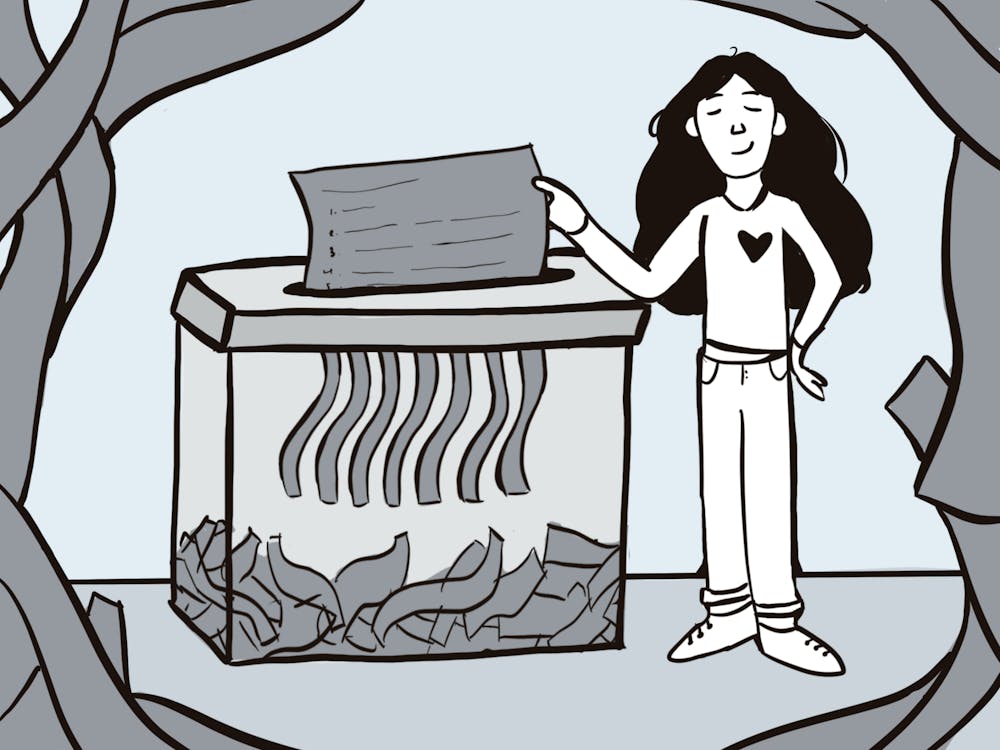
I didn’t really know what slam poetry was before high school, when a friend and I went to see a performance by Sarah Kay and Phil Kaye, probably two of the most well-known spoken word poets around. I never considered trying spoken word. However, a poem by Sabrina Benaim caught my eye and changed the way I view the power and purpose of poetry — as not just therapeutic but actively empowering.
In her poem “Explaining My Depression to My Mother,” Sabrina Benaim weaves an emotional conversation between herself and her mother, in which she tries to describe what it feels like to live with depression. She begins by calling her depression a “shapeshifter” and confesses that she has learned to endure its volatile nature by “play[ing] dead until the bear leaves me alone.” The action of playing dead is such a helpless act of self-preservation that it shows readers how those with depression can’t control its ebbs and flows.
Later on, she likens being depressed to “sleepwalking on an ocean of happiness that I cannot baptize myself in.” Her depictions of depression as a predator that prevents her from being submerged in the vast possibility of happiness make these two of the most heartbreakingly vulnerable images in her poem.
Benaim calls this poem the one she’s been the most afraid to write but one that most needed to be written. It’s important to show depression, anxiety and other mental disorders in the routine of everyday life, not just in moments of extreme hopelessness or despair. At one point, she describes her depression as “falling asleep watching SportsCenter on the couch to avoid confronting the empty side of my bed” to show how pervasive loneliness is throughout her life — loneliness that causes her to isolate herself from her loved ones even though she knows she shouldn’t.
The poem is performed with images flowing fluidly from each other. The lack of punctuation-mandated stops only increases its urgency. While watching the video of her performance, I remember feeling shocked at seeing Benaim visibly terrified of baring her emotions to the audience. By the time she arrives at the final lines (“Mom still doesn’t understand / Mom, can’t you see that neither can I?”), the blazing desperation in her voice is patently obvious in a way that simply reading her words on a page cannot convey.
Throughout the poem and leading up to her conclusion, Benaim also imagines various objections from her mother, including, “I thought the problem was that you can’t get out of bed,” “Why don’t you try going to actual parties, see your friends” and, perhaps the most haunting, “Happy is a decision.” The speaker can only reply “my happy is a high fever that will break,” as if her body has reset its natural temperature and mood against her will and out of her control.
Although she addresses the poem to her mother, her message should resonate with anyone who has any preconceived notions of how mental illnesses present themselves.
There are so many beautiful lines and images from Benaim’s poem, but the line that affected me the most was “Mom says I am so good at making something out of nothing.” Perhaps, in this case, the mother’s inability to understand her daughter’s depression stems from her unwillingness to see her daughter as being sick. For me, this draws attention to how not understanding an issue makes someone more liable to dismiss it. Depression that doesn’t render someone near-suicidal is not “nothing,” which I think people often overlook until it’s too late. Regardless of personal mental health, I’m sure everyone can relate to the pain and frustration of having someone else invalidate your reality or even just something you wholeheartedly believe.
As someone who isn’t depressed but who’s faced different mental health issues, both personally and through trying to help friends with their struggles, I was scared to write about this poem and this topic for fear of not being able to say what I needed to say — and I still am. I admire that Benaim reassures her viewers that they may not be able to understand their mental disease or why they have it, but admitting that they aren’t okay is the first step.
This poem is simultaneously a validation of the struggles and confusion that people with mental illnesses face as well as an urge to reevaluate the way we define and describe mental illnesses that many view with great stigma. Spoken word is just one avenue through which we can help break down that stigma and craft supportive communities to return a voice to the people whose teeth are, as Benaim writes, “broken from biting down on themselves.”






















Please note All comments are eligible for publication in The News-Letter.